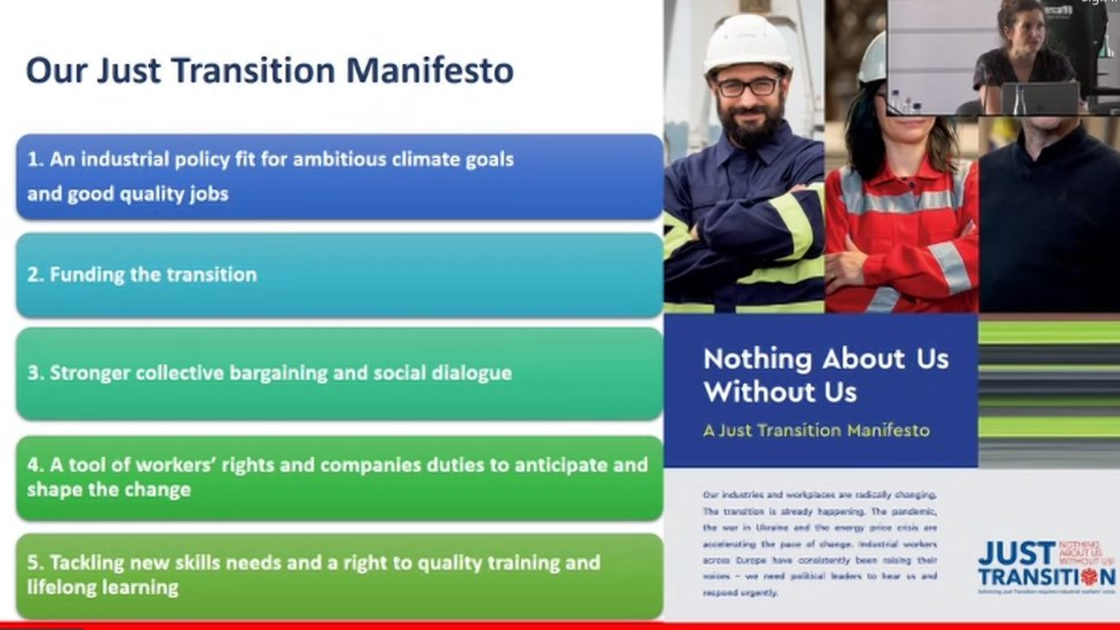The central focus was to deliberate on the challenges and opportunities associated with the energy transition in the region. The workshop served as a platform for an in-depth examination of the nuances surrounding the transition towards knowledge-based economies, a journey full of challenges and opportunities.
The challenges in the context of the industrial and energy transition are huge. In the context of their candidate status to the European Union (except for Kosovo) the countries have to implement crucial EU energy and climate legislation including the set up of a carbon price which is underway for the region. This implies significant challenges for the industrial sectors to adapt production processes with huge investment needs and needs to anticipate and manage the changes in the labour market. However, unlike for the European level there is no dedicated funding for the decarbonisation nor for the just transition of workers.
Funding needs for decarbonisation of the Western Balkan countries are estimated to be EUR 40bn excluding additional needs to fund the just transition of workers and regions. The EUR 9bn provided for within the Economic and Investment Plan 2021-2027 for Western Balkan countries put forward by the European Commission are falling dramatically short of the current and future needs.
Trade unions also posed a question concerning the long-term strategies by their national governments that were often driven rather by the will to remain in power than by the goal of achieving sustainable development of industries and workers.
Moreover, the unions’ leverage to anticipate and manage the changes under way, is significantly limited due to the weakening of trade unions and their rights, the lack of social dialogue on a sectoral level and a lack of involvement of unions in strategic planning on all levels. The increasing role of investments from multinational companies, e.g. from China, also meant pressure on working and employment conditions.
One of the central themes that emerged from the discussions was the pressing need for skilled labor, a critical component in navigating the complexities of economic transformation. Skills shortages were even exacerbated by a brain drain of young people leaving the region due to better jobs and pay in other countries. There is also a competition of other sectors (such as ICT) where working conditions and pay are more attractive than in industrial sectors. Companies are increasingly focusing on recruiting migrant workers from Asia and Africa while lowering working and employment conditions. This is also a problem for the unions trying to organise these workers and negotiating decent and attractive working conditions in crucial industrial sectors. Affiliates talked about the landscape of transitioning economies, highlighting the imperative of investing in research and development, nurturing a proficient workforce, and instating incentives to drive decarbonization efforts forward.
In the context of the green transition and the advent of Industry 4.0, unions underscored the significance of collaboration among stakeholders, particularly within the automotive sector and the broader innovation ecosystem. Such collaborative endeavors, they argued, are instrumental in bolstering competitiveness amidst soaring energy prices and stiff competition from global counterparts.
Another common challenge in the region is the lack of trade union involvement in strategic planning and decision-making in a context of the transition due to significantly weakened industrial relations systems and a lack of political will to engage trade unions. Unions are also deploring the loss of members and problems in organizing new members across sectors in the region. There is a need to strengthen the regional union cooperation to support organising , including in emerging sectors, and promote social dialogue.
The local offices of the Friedrich Ebert Stiftung are doing important work in supporting unions in the transition process, including in involving them in the exchange programmes with other European coal regions in the context of the Coal Regions in Transition Initiative for Western Balkan Countries and Ukraine. However, this involvement must now also be promoted on a national level bearing in mind the crucial role of workers in the transition.
Isidora Beraha, representing the Institute of Economic Sciences, provided insights into the regional dynamics and the transformative potential inherent in the Western Balkans countries' industrial value chains. Emphasising the pivotal role of regional cooperation, Beraha elucidated on the pathways that can empower companies in the region to ascend the ladder of global value chains, thereby enhancing their competitiveness on the international stage.
Judith Kirton-Darling, General Secretary of industriAll Europe said: “The challenges and investment needs of the Western Balkan countries are significant also in the context of the EU enlargement process. We must ensure that the transformation process is ruled by the principles of a Just Transition promoting crucial workers’ and trade union rights. In a context of the need to decarbonise, we must move away from profit-driven strategy making towards more sustainable production and consumption patterns with an active participation of trade unions. The transition is not possible without the workers, so we must strengthen social dialogue and give them a seat at the table. Nothing about us, without us!"
The workshop not only served as a forum for dialogue but also as a catalyst for actionable strategies aimed at navigating the intricacies of the energy transition. By fostering collaboration, knowledge-sharing, and collective action, IndustriALL Global, industriAll Europe and its affiliates are at the forefront of driving positive change and ushering in a sustainable future for the Western Balkans region.
Kan Matsuzaki, Assistant General Secretary at IndustriALL Global "This workshop underscores the commitment of IndustriALL and its partners to tackle pressing issues head-on, steering the course towards a future that is not only sustainable but also equitable, inclusive and just for all".
